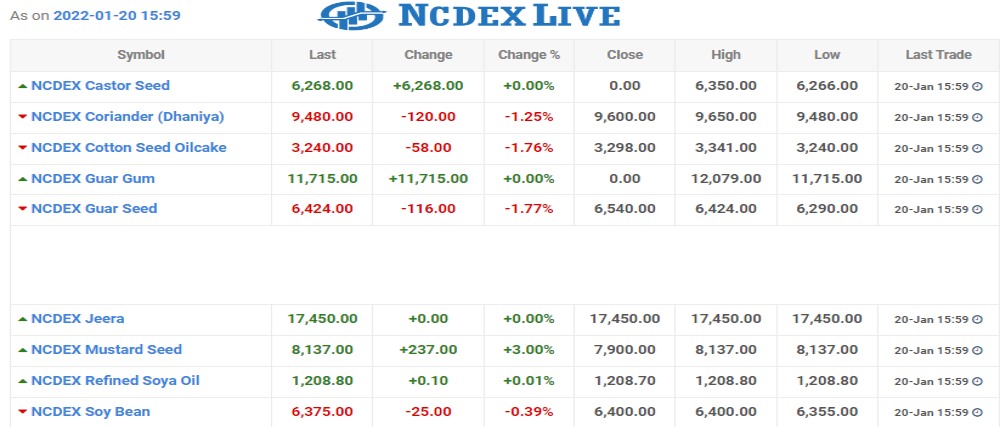
To encourage farmer producer organisations (FPOs) to take benefit of trading in ‘options in goods’ on its platform, commodity bourse NCDEX on Monday said it will bear premium for trading up to 5,000 tonnes of chana and mustard seeds as part of its familiarisation initiative.
This initiative is supported by markets regulator Sebi through a regulatory fee that has been foregone by it for supporting FPOs and farmers’ participation in the derivatives market, it said.
Initially, under this initiative, FPOs can buy ‘put options’ in two commodities mustard seed and chana which are being sown by farmers in the ongoing rabi season, it added.
The move comes amid lack of awareness among farmers about the recently launched ‘options in goods’, which gives opportunity to FPOs and farmers to lock in the selling price for their crop at the time of sowing simultaneously protecting their right to participate in case prices rally.
As the premium is known in advance, FPOs can factor it in their cost of cultivation. This will certainly help FPOs and farmers in calculating their return and taking an informed decision while selecting new crops for sowing.
“However, to make farmers familiar with the new trading tool, we have decided to bear the premium for 5,000 tonnes of mustard and chana especially for FPOs,” NCDEX Managing Director and CEO Vijay Kumar said in a virtual press conference.
Initially, FPOs having experience in futures trading on the NCDEX platform will be handheld, he said. They will make the farmers familiarise with modern market tools to optimise their incomes, Kumar added.
He further said the premium cost is not much. For instance, it is about Rs 200-250 per quintal for mustard which needs to be paid to the underwriter for taking the risks.
These tools are even more helpful for banks and other financial institutions, who extend commodity finance to farmers and have a risk if prices go down, this tool can be clubbed as a price protection measure to give much-needed protection to both lender and borrower, Kumar said.
NCDEX Business Head Kapil Dev said farmers pay for seeds, fertilisers and other inputs. Likewise, there is a cost for locking price for their produce before sowing.
“It is not crop-insurance but self insurance. Farmers’ liability will be limited to premium. It is a tool that will protect farmers in the long run,” he added.
Sebi in January 2020 allowed the exchanges to launch ‘options in goods’ in their commodity derivatives segment. In view of this, the NCDEX launched such contracts on three commodities wheat, mustard seed and maize in July.
Subsequently, four more commodities chana, soyabean, guar gum refined splints and guar seed were added in the exchange’s portfolio under the segment.
The contract of options in goods will be settled only through compulsory delivery on the day of the expiry. The quality specifications, delivery centres, final settlement price methodology and trading hours, among others, in the option contracts will be similar to the corresponding futures contracts.
